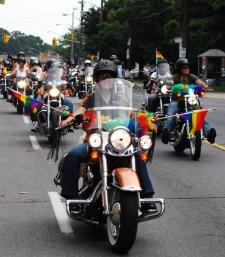For the first time in its six years, the Dyke March has to pony up cash to have police officers supervise the event. Organizers say it’s an unexpected yet fair expense and they are looking to the community for help.
“[Raising extra money for police officers] is going to be a challenge,” says Dyke March treasurer Catherine Purdie.
After all, for the already cash-strapped event it’s an extra $500 per officer, and organizers must hire a minimum of two officers. Although this is the first year the Dyke March must pay for officers, the city says police presence was always required but it wasn’t paid for before because it slipped through the cracks.
“If we were a protest, we wouldn’t have to pay. But we’re not a protest,” says Purdie. “We’re not asking the city for anything different than any other group. I think the city is very supportive of the queer community in Ottawa. We’re working very closely with [the city] and they’re helping us out a lot. They’re giving us shortcuts. The real story is the Dyke March is going to happen and it’s going to be better than previous years.”
Purdies also points out that by having officers present, the Dyke March could not be sued if someone is injured along the way.
Organizations like the Dyke March have to decide whether they want to grow or stay small, says special events Sgt Denis Charbonneau.
“[The Dyke March] used to be a sidewalk march,” says Charbonneau. “It’s certainly not the size of [Capital Pride] but they’re taking up major intersections and using props like motorcycles. The march is growing. If you grow, you need officers. And it’s grown to the point where they have to hire police officers.”
Charbonneau says the number of police officers required for a parade doesn’t necessarily reflect how many people are involved in it. For example, a recent marathon of 5,000 to 10,000 participants running along the Ottawa River Parkway between Booth St and Island Park Dr only required three police officers. Events that take place on busy roadways with many intersections require more security and police supervision, says Charbonneau. For example, more officers are required for the Santa Claus parade because it has lots of floats, cars, hundreds of participants and spectators, and runs through major intersections.
“[The City of Ottawa] is used to having parades,” says Charbonneau. “We try to improve our security strategies to know how many officers are needed. For grassroots organizations [like Dyke March], we try to work with organizers to reduce the amount of police officers needed.”
“The Dyke March has been growing over the years,” says Dyke March committee member Suzie Abcarius. “We knew police officers would eventually be required. It’s not a major issue. Next year, we’ll have to consult with the community to see if they want the Dyke March again.”
“Financially speaking, the Dyke March is in a tight bind,” says Dyke March committee member Lee Allard. “We’re not accusing the city of anything. We’re calling out to the community for support.”
Dyke March Ottawa begins Sat, Aug 29 at 1pm at the Human Rights Monument on Elgin St, with two guest speakers who will kick off the event. The march starts at 1:30pm and ends at Jack Purcell Community Centre on Elgin St. The route has yet to be been determined because the committee is still negotiating with police to determine how many officers will be required. In the meantime, Dyke March organizers are seeking donations, sponsorship, and volunteers.
For general information, email dykemarchottawa@yahoo.ca. To make cash donations and inquire about sponsorships, email Catherine Purdie at catherine-purdie@rogers.com. There is also a Facebook group titled Dyke March Ottawa.

 Why you can trust Xtra
Why you can trust Xtra


